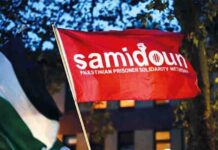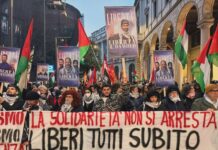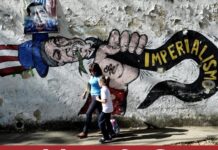
The following article, by Palestinian prisoner leader Munther Khalaf Mufleh, is republished from the original Arabic, from the Handala Center.
After the escalation of Zionist attacks against the achievements gained by the prisoners’ movement over the years, and the attempts of the fascist Ben Gvir to seize our rights by enacting laws and policies such as the laws for the execution of prisoners, revocation of nationality, and deportation of prisoners and former prisoners, as well as the attacks on the achievements of daily life of the prisoners’ movement, such as cutting access to water, setting brief times for bathing and the imposition of dozens of punitive measures, such as repeated transfer and isolation, led the prisoners’ movement to take action. These policies express the hateful, racist nature of Zionism, revealing its true face and its mechanisms that always aim to target all that is Palestinian. The prisoners’ movement implemented a series of escalating tactical measures, and prepared and threatened to launch an open, collective hunger strike on the first day of Ramadan.
With these steps, the prisoners’ movement aimed to teach the enemy a new lesson, and began to implement this by announcing the names of Palestinian national leaders who would begin the open hunger strike, led by the General Secretary of the Popular Front for the Liberation of Palestine, the leader Ahmad Sa’adat, and leaders of all factions, headed by Mohammed Al-Tus, Abu Shadi; Hassan Salameh; and a long convoy of heroes of the prisoners’ movement.
For the first time since 1993, the equation of direct dialogue was imposed with the presence of the full Higher Emergency Committee, representing all Palestinian factions, under the slogan of “national unity and true partnership.” Through its first message to the masses, it signed a charter of honor to consolidate this concept of partnership and unity, especially as it was the first emergence of the name of the emergency committee. This aims to promote unity, not only at the level of the prisoners’ movement, but at the level of our Palestinian people everywhere they are.
During its marathon discussions with the Zionist prisons authority, the Emergency Committee formed a strong and solid model in which the demands of the prisoners’ movement were presented with boldness and revolutionary fervor, defying all obstacles with the firm commitment that rights are not begged for, but rather taken.
This was implemented in practice during these sessions, and the outcomes were as follows:
- Decisions about the living conditions are taken by the full Zionist cabinet and not by a sole decision of the criminal Ben Gvir and his office.
- The removal of two prisoners from solitary confinement, who have been involved in resistance.
- Return of the water supply to normal without limitations on time.
- Returning kitchen access to prisoners in Ofer Prison.
- Opening public facilities (“canteen” or prison store, laundry, barber, etc) in the Negev prison on Friday.
- Allowing communication on the public telephone from the Ramle prison clinic five times a week.
- Closing the files of a number of administrative detainees [and ensuring their detention is not renewed], especially elderly detainees.
- Opening a special section for detained prisoners after their arrest.
- In addition to a number of demands that require follow-up from the emergency leadership to be implemented within the sections, and they will need periodic follow-up from the section representatives.
All of these achievements would not have been realized if it had not been for the will of our Palestinian people and their valiant resistance that was present with us and always pushes us to greater action, but this achievement is a step on the road of a thousand miles to our goal of freedom and liberation. It can be built upon to escalate the pressure on the occupation, to extract further achievements and to stop the policies of harassment and oppression by the prison authority, in order to achieve the dream of liberation.
Munther Khalaf Mufleh is a Palestinian political prisoner, a member of the Central Committee of the Popular Front for the Liberation of Palestine. He is director of the Handala Center for the Prisoners’ Movement Affairs and the spokesperson for the PFLP prison branch. He is a Palestinian writer and journalist, and was issued a membership by the Palestinian Journalists’ Syndicate while imprisoned in recognition of his work.
Discover more from Samidoun: Palestinian Prisoner Solidarity Network
Subscribe to get the latest posts sent to your email.




